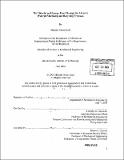The material and energy flow through the abrasive waterjet machining and recycling processes
Author(s)
Kurd, Michael Omar, 1982-
DownloadFull printable version (6.027Mb)
Other Contributors
Massachusetts Institute of Technology. Dept. of Mechanical Engineering.
Advisor
Timothy G. Gutowski.
Terms of use
Metadata
Show full item recordAbstract
The purpose of this thesis was to investigate the material and energy flow through the abrasive waterjet machine and the WARD recycling machine. The goal was to track all of the material, water, abrasive, energy, air, and tooling through the different components of the machining and recycling processes. The material removal was found to be a function of length and part geometry, while all of the other variables were simply a function of time. The cutting speed determines the abrasive use, water use, and power use, and is varied based on the material, geometry, thickness and cut quality. The cutting speed was found to be linear with machineability--a measure of the material, almost linear with hardness--inversely related to thickness, somewhat inversely related to quality, and linear with power. Water was found to be the most abundant consumable, following by abrasive, together making up over 99% of the output waste. In the recycling process, roughly 60% of abrasive can be recycled after a single use, with the only significant consumable being power, used to dry the moist abrasive. Replacement tooling on both the abrasive waterjet and the WARD recycling unit were found to be negligible compared to the large amount of abrasive sludge produced every minute.
Description
Thesis (S.B.)--Massachusetts Institute of Technology, Dept. of Mechanical Engineering, 2004. Includes bibliographical references (p. 109-111).
Date issued
2004Department
Massachusetts Institute of Technology. Department of Mechanical EngineeringPublisher
Massachusetts Institute of Technology
Keywords
Mechanical Engineering.